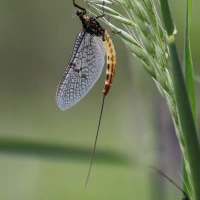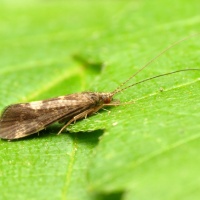Toxic legacy of historical pollution hinders ecological recovery on urban rivers

Toxic chemicals released in past decades could be impeding the ecological restoration and recovery of Britain’s urban rivers, according to a new study. ‘Legacy pollutants’ such as PCBs (Polychlorinated Biphenyls) and flame-retardant chemicals (PBDEs) from historical industrial discharge persist in river catchments, potentially disrupting aquatic food webs.
Fred Windsor, lead author of the new study, explained: “Despite major success in controlling sewage pollution in South Wales’ rivers over the last three decades, something appears to be holding back biological recovery.” Windsor, a doctoral student at Cardiff University, continued: “Our investigations show that persistent contaminants might be responsible as they still occur widely in invertebrates, particularly in urban river environments.”
Windsor and colleagues sampled eighteen sites across the Taff, Usk and Wye catchments in South Wales. They found that sites in urban locations had damaged food chains and fewer invertebrate species compared to more rural rivers.
Water quality and ecological health has been dramatically improved on these rivers since the 1970s, when over 70% of South Wales rivers were classified as ‘grossly polluted’ due to a combination of poor sewage treatment, colliery waste and industrial discharge.
However, writing in the journal Water Research, Windsor and colleagues suggest that the toxic pollutants from this era still persist in urban rivers, hampering efforts to continue their ecological recovery.
Co-author Professor Charles Tyler, from the University of Exeter’s School of Biosciences, explained: “These apparent effects of what we call ‘legacy’ pollutants – PCBs, flame retardants, organochlorine pesticides and other complex organic chemicals that have now been largely discontinued from production and use – are yet another reminder that we continue to live with problems caused by toxic chemicals from past decades. These chemicals still occur widely in rivers, lakes and seas in Britain and beyond, and still affect a wide range of animals.”
The research team found that river food webs at the most highly contaminated urban sites had a lower diversity of species and ecological functions, compared to less contaminated sites. Food webs at contaminated sites had a simplified structure, and a reduced abundance in prey important for apex predators such as the dipper.
Co-author Professor Steve Ormerod of Cardiff University’s School of Biosciences and Water Research Institute summarised: “Urban river ecosystems in Britain have been on an improving trajectory since at least 1990, but there is still a way to go before we can say that they’ve wholly recovered from well over a century of industrial and urban degradation.
“The ecological pressures on our rivers are multiple, ranging from combined sewer overflows to engineering modifications, and this research adds a new dimension to understanding why they’re not yet at their best,” Ormerod said.
“The slow degradation of some pollutants means that we may have to wait a long time before these chemicals disappear. Perhaps one of the lessons is that we should avoid ecosystem damage in the first place rather than try to solve problems after they occur.”
+++
Windsor, F. et al (2019) Persistent contaminants as potential constraints on the recovery of urban river food webs from gross pollution, Water Research, Volume 163, 15 October 2019, 114858 (open-access)















Comments are closed.